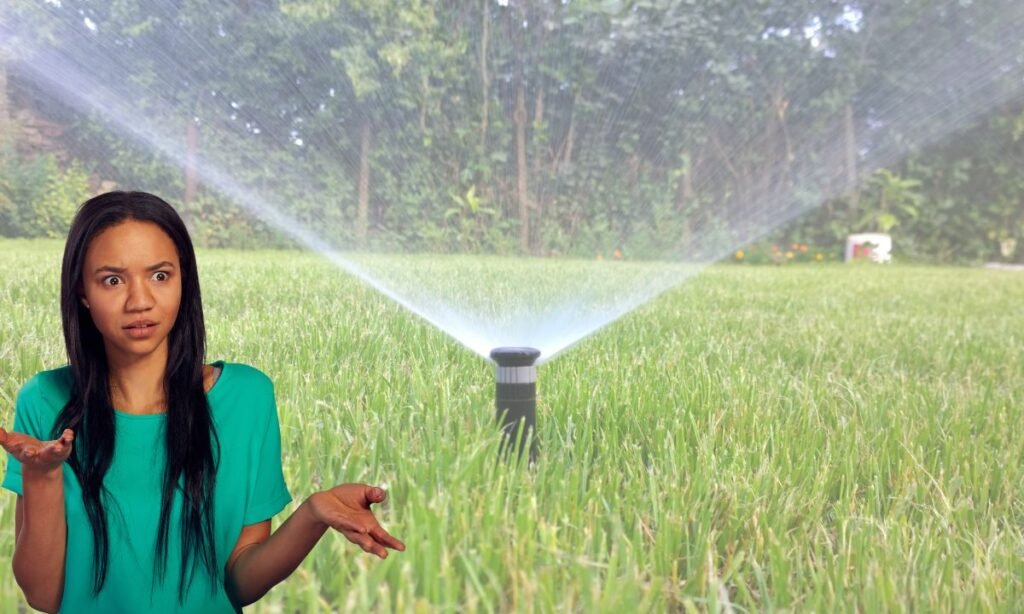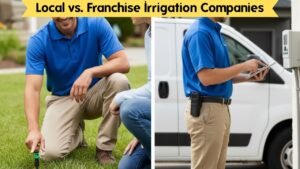When your sprinkler system starts showing signs of trouble, you might find yourself at a crossroads: Should you repair it or invest in a new one?
This guide will help you decide between sprinkler repair or replacement by examining costs, benefits, and key considerations.

Understanding Your Sprinkler System’s Condition
Before deciding on repair or replacement, it’s crucial to evaluate your current sprinkler system’s condition.
Here’s what you need to consider:
1. Age of the System
- Older Systems (10-15 years old): Systems that have been in place for over a decade often struggle with efficiency. They may lack modern features and are more prone to frequent breakdowns. If your system is nearing or surpassing this age, it might be time to think about replacement.
- Newer Systems: Systems that are relatively new and have been well-maintained typically benefit from repairs rather than a full replacement.
2. System Condition
Common issues include:
- Leaks: A leaking system not only wastes water but also increases your utility bills. Typical repair costs for leaks range from $100 to $200. Addressing leaks promptly can prevent more significant damage.
- Broken Sprinkler Heads: Broken or malfunctioning sprinkler heads can lead to uneven watering. Replacing a single sprinkler head costs around $20-$30. Regular maintenance can help prevent such issues.
- Faulty Controllers: If your system’s controller isn’t functioning correctly, it can disrupt watering schedules. Replacing a controller may cost between $150 and $300. Newer controllers come with advanced features like rain sensors, which can optimize watering schedules.
3. Repair Costs vs. Replacement Costs
- Repair Costs: For minor issues, repairs are usually cost-effective. Examples include fixing a leaky pipe or replacing a sprinkler head. Minor repairs generally cost between $75 and $500.
- Replacement Costs: Installing a new system is a more significant investment, typically ranging from $2,500 to $7,000. However, a new system comes with benefits such as improved water efficiency and modern technology.
Old systems may not meet current efficiency standards. Modern systems are equipped with:
- Smart Controllers: These adjust watering schedules based on weather conditions, potentially saving up to 30% on water usage.
- Rain Sensors: They prevent watering when it’s raining, contributing to water conservation.
5. Lawn Health
A malfunctioning system can affect your lawn’s health by creating uneven watering patterns. A new system ensures:
- Even Coverage: Modern systems provide better coverage, which can lead to a healthier, more vibrant lawn.
- Improved Root Growth: Even watering promotes deeper root growth and reduces the risk of lawn diseases.
6. Environmental Impact
Upgrading to a new system can have significant environmental benefits:
- Water Conservation: New systems often use water-saving technology that reduces usage. For instance, modern systems can save thousands of gallons of water per year.
When to Repair Your Sprinkler System
Today’s Task’s YouTube video below “Sprinkler Repair Quick and Easy” (published four years ago) shows fast fixes for common irrigation issues. With simple tools and steps, the guide helps homeowners tackle repairs themselves, saving both water and money while keeping systems in top shape.
Repairing your sprinkler system can be a practical choice under certain conditions.
Here’s when a repair might be the best option:
1. Minor Issues
- Broken Sprinkler Heads: Replace or repair broken heads yourself by following simple DIY guides. This typically involves unscrewing the old head and installing a new one.
- Small Leaks: For minor leaks, you can cut out the damaged section of the pipe and replace it. Use appropriate fittings and sealant to ensure a secure fix.
- Controller Troubleshooting: Check the wiring and replace batteries. If issues persist, consulting a professional may be necessary.
2. Cost-Effectiveness
Minor repairs are often more affordable and can extend your system’s lifespan. If the cost of repairs is significantly lower than replacement and the system is otherwise in good condition, repairing can be a viable option.
3. Average Lifespan of Components
- Sprinkler Heads: 10-15 years
- Pipes and Controllers: Up to 20 years
If your system components are within their expected lifespan and showing minor issues, repairing might be a good choice.
When to Replace Your Sprinkler System
Sometimes, a replacement is the more sensible option. Consider a full system replacement in the following scenarios:
1. Extensive Damage
- Frequent Repairs: If you find yourself frequently repairing different parts of your system, replacing it might be more cost-effective in the long run.
- System Age: If your system is over 15 years old, it might not be worth investing in further repairs.
2. Outdated Technology
- Smart Controllers and Zone Control: Modern systems offer features like smart controllers that adjust watering based on weather forecasts. They can also provide better zone control for tailored watering.
3. Replacement Checklist
- Signs for Replacement:
- Frequent breakdowns
- System age over 15 years
- Inefficient performance
4. Benefits of Upgrading
New systems can lead to significant long-term savings due to increased efficiency and reduced water usage. Additionally, advanced features improve overall system performance and ease of use.
DIY vs. Professional Help
1. DIY Repairs
- Simple Tasks: Replacing a sprinkler head or fixing a minor leak can often be handled yourself. Detailed guides and video tutorials are available for these tasks.
2. Professional Help
- Complex Issues: For significant problems or if you’re unsure about your DIY skills, hiring a professional sprinkler repair services ensures accurate repairs and installation. Professionals also provide expertise in system upgrades and maintenance.
Finding a
Choosing the right contractor is crucial for effective repairs or replacement:
Reliable Sprinkler Contractor
1. Verify Credentials
- Licenses and Insurance: Ensure the contractor is licensed and insured. Check for industry certifications and customer reviews.
2. Obtain Multiple Quotes
- Comparing Costs: Get quotes from several contractors to compare prices and services. This helps you make an informed decision.
3. Warranties and Service Contracts
- Peace of Mind: Choose contractors who offer warranties and service contracts to protect your investment and ensure long-term support.
4. Additional Criteria
- Experience with Brands: Look for contractors with experience working on your specific sprinkler system brand.
Preventive Maintenance
Regular maintenance extends the lifespan of your sprinkler system and prevents future issues:
1. Seasonal Maintenance Checklist
- Spring: Inspect and adjust sprinkler heads, check for leaks, and ensure the system operates correctly.
- Summer: Monitor system performance and adjust settings as needed.
- Fall: Winterize the system to prevent freezing and damage.
2. Regular Inspections
Schedule annual inspections to identify potential issues early and keep your system running efficiently.
Conclusion
Deciding whether to repair or replace your sprinkler system depends on factors like age, condition, and costs. By evaluating these elements and understanding the benefits of modern systems, you can make an informed decision that suits your needs.
For expert advice and professional services in Wichita, contact local sprinkler specialists who can provide personalized recommendations and ensure your system operates at its best.










